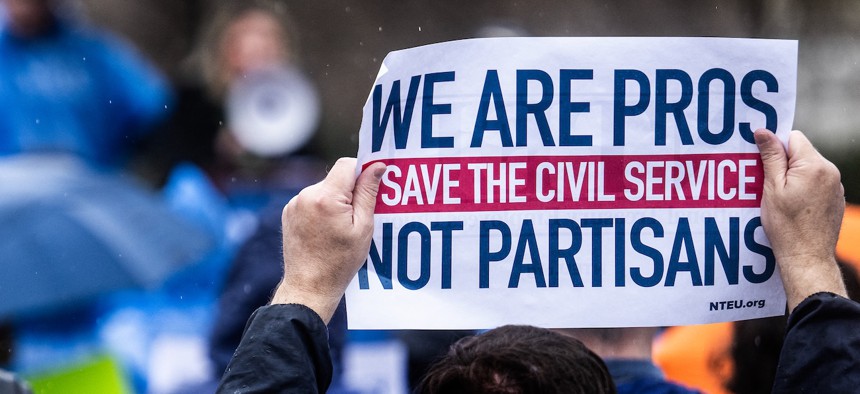
National Treasury Employees Union members during a "Standing Strong to Serve the Nation" rally to protest the Trump administration's "attacks on federal employees" at Upper Senate Park on Capitol Hill in Washington, D.C, on March 5, 2025. NTEU joined with other labor groups and filed lawsuits aimed at blocking the president’s effort to gut civil service protections. JIM WATSON/AFP via Getty Images
Appeals court issues stay of judge’s decision blocking Trump’s anti-union order
The Trump administration may recommence stripping the union rights of two-thirds of the federal workforce, for now.
The two Republican-appointed members of a three-judge panel on the U.S. Court of Appeals for the D.C. Circuit on Friday issued a stay of an April preliminary injunction that blocked the Trump administration’s efforts to strip two-thirds of the federal workforce of their collective bargaining rights on national security grounds, allowing the White House to resume its union-busting campaign while the legal challenge plays out.
Last month, U.S. District Judge Paul Friedman found that President Trump’s March executive order, which cited a rarely used provision of the 1978 Civil Service Reform Act to ban unions at most federal agencies under the guise of national security, served as a “pretext” for retaliating against the National Treasury Employees Union and the labor groups for filing lawsuits aimed at blocking the president’s effort to slash federal jobs and gut civil service protections. In a separate decision this week, Friedman also blocked the edict as it pertained to U.S. Foreign Service officers, who operate under a parallel personnel system with similar union rights.
But, following an appeal by the White House, Circuit judges Karen Henderson, a George H.W. Bush appointee, and Justin Walker, a Trump appointee, issued a stay in the NTEU case, a move that will allow the administration to resume implementation of the order while the panel considers the case. Circuit Judge J. Michelle Childs, who was appointed by former President Biden, dissented in the matter.
The court’s majority wrote that the Trump administration is likely to win its appeal on the grounds that the union has failed to prove that they have suffered the irreparable harm necessary for a preliminary injunction to be issued. Monetary harms alone are generally considered reparable because courts may issue monetary damages at the conclusion of a lawsuit, and the two judges found that NTEU’s other claims were “speculative” because of Office of Personnel Management guidance instructing agencies not to formally terminate collective bargaining agreements until the conclusion of management lawsuits seeking the legal green light in a pair of conservative-leaning court districts.
“The union asserts that without a preliminary injunction it will losing bargaining power and suffer reputational harm that will deter present and future membership," the court wrote. "But those harms are speculative because they would materialize only after an agency terminates a collective bargaining agreement, and the government directed agencies to refrain from terminating collective bargaining agreements or decertifying bargaining units until after the litigation concludes.”
As Government Executive has reported and OPM encouraged in the same memo warning not to formally terminate union contracts, federal agencies have ceased abiding by those contracts in practice, including by abandoning participation in arbitrated grievance hearings, ceasing collective bargaining negotiations and surreptitiously ceasing the collection of union dues from employees’ paychecks.
The judges also argued that the injunction amounts to an “irreparable harm on the president by impeding his national-security prerogatives, which were explicitly recognized by Congress.”
“The injunction eliminates the president’s control over the decision to pause implementation of the executive order and, by consequence, his flexibility to respond to future developments, at least without returning to the district court,” they wrote. “In other words, the preliminary injunction ties the government’s hands.”
In her dissent, Childs rejected that logic as an attempt to “glide over” the government’s own irreparable harm barrier.
“In one brief paragraph, the government claims that a stay would protect the president’s ability ‘to guarantee the effective operation of the agencies relevant to national security without the constraints of collective bargaining,’” she wrote. “But the district court’s injunction maintains the state of affairs that has existed for nearly half a century: NTEU has bargained on behalf of federal workers since the 1970s. The government does not explain why irreparable injury will result from continuing this decades-long practice for a short period of time while we adjudicate the merits of this appeal.”
And she described an “inconsistency” at the heart of her colleagues and the White House’s claims: that an injunction blocking the order’s implementation constitutes “irreparable harm” while the implementation guidance purportedly tells agencies to wait.
“The government asserts that NTEU does not suffer irreparable harm to justify the district court’s injunction and will not be harmed by a temporary stay on appeal because, per the FAQ document, ‘agencies have been advised not to terminate collective bargaining agreements at this time and not to decertify bargaining units until litigation is final,’” Childs wrote. “But the government does not explain how it can show its own injury from the district court enjoining an already-paused executive order.”
How are these changes affecting you? Share your experience with us:
Erich Wagner: ewagner@govexec.com; Signal: ewagner.47
NEXT STORY: A judge has moved again to block Trump’s anti-union EO







